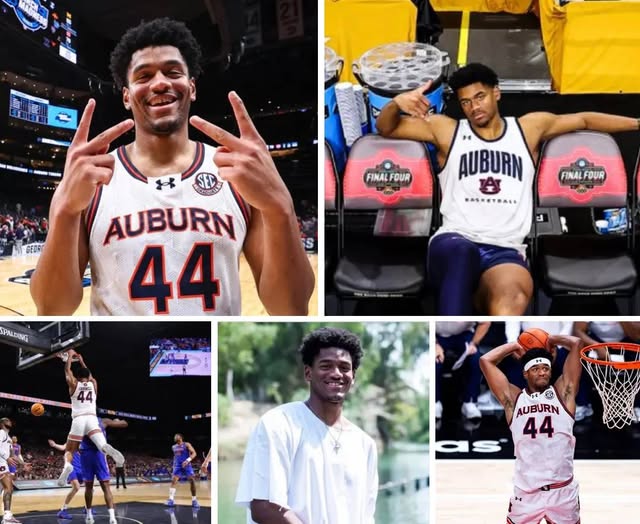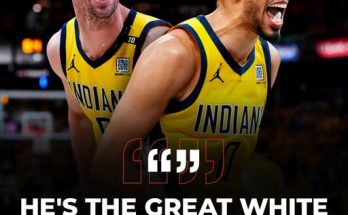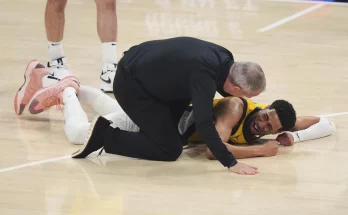There’s something sacred about a player who electrifies a fanbase, who inspires a generation, and who defines an era. For Auburn basketball fans, there is no doubt that Charles Barkley stands as the most iconic figure in the program’s rich history—a Naismith Hall of Famer, an NBA legend, and an irrepressible ambassador for the Tigers. But just a heartbeat behind him, in terms of love, reverence, and mythos among the Auburn faithful, stands another name that burns just as brightly in memory: Chris Porter.
It takes a special kind of player to be mentioned in the same breath as Sir Charles. Porter, with his explosive athleticism, magnetic personality, and game-changing presence, carved his name into the soul of Auburn basketball in a way few others ever have. Though his time on the Plains was brief, it was incandescent—a supernova of high-flying dunks, seismic victories, and a deep NCAA Tournament run that, to this day, marks the high-water mark of Auburn’s basketball program before Bruce Pearl’s renaissance.
Porter was not just a star. He was the star. And for those who watched him rise, fly, and fight, there remains no question: next to Charles Barkley, there may not be a more beloved player in Auburn basketball history.
The Arrival: A JUCO Star Comes to the Plains
Before he was a household name in SEC circles, Chris Porter was making waves at Chipola Junior College in Florida. A standout performer with a reputation for jaw-dropping dunks and relentless motor, Porter was named the 1998 National Junior College Player of the Year. Recruiting services buzzed with speculation about where he’d land. Auburn, under head coach Cliff Ellis, won the sweepstakes.
When Porter arrived on campus, Auburn wasn’t exactly a basketball power. The Tigers had not been to the NCAA Tournament in nearly a decade. The football program had always taken center stage, and the basketball team played in the shadows of larger, more storied SEC programs like Kentucky and Arkansas.
But Porter was about to change all of that.
1998–99: The Dream Season
The 1998–99 season stands as one of the greatest in Auburn history—and Chris Porter was the engine, the electricity, and the emotion behind it all.
The Tigers began the season under the radar. But led by Porter, they quickly turned heads. With his explosive leaping ability, rim-rattling dunks, and uncanny nose for the ball, he became a walking highlight reel and a matchup nightmare. He played with a chip on his shoulder, with a rawness that felt visceral. Auburn fans didn’t just watch him play—they felt him play.
That Auburn team soared to unprecedented heights, going 29–4 overall and a staggering 14–2 in the SEC. They were the regular season SEC champions and earned a No. 1 seed in the NCAA Tournament—Auburn’s first and only No. 1 seed in school history. They reached the Sweet 16, dispatching Winthrop and Oklahoma State before falling to Ohio State in a hard-fought battle that ended their magical run.
Porter averaged 16 points and 8.6 rebounds per game that season. He was named a First Team All-American by the Associated Press and the SEC Player of the Year. He was the first Auburn player to earn All-American honors since Charles Barkley in 1984.
In just one season, Chris Porter transformed Auburn basketball from an afterthought into a juggernaut. And he did it with style, flair, and the kind of intensity that made every game an event.
The Legend Grows
Porter’s second season at Auburn was filled with high expectations. The Tigers entered the year ranked in the top 10, and Porter was a preseason All-American. But adversity struck. The team was inconsistent, injuries mounted, and Auburn couldn’t recapture the magic of the previous year.
Then came the controversy.
In February 2000, Chris Porter was suspended by the NCAA for accepting money from an agent. The suspension effectively ended his college career and clouded what had otherwise been a meteoric rise. Auburn’s season faltered without him, and Porter’s name became entangled in the broader conversation about NCAA rules, athlete compensation, and the blurry line between amateurism and professionalism.
Despite the unceremonious ending, Porter’s legacy was already sealed. Auburn fans didn’t abandon him—they rallied behind him. To them, Porter was a warrior who gave everything he had, a victim of an outdated system that failed to protect the very athletes it claimed to serve.
A Leap to the NBA and the Journey Beyond
Chris Porter was selected 55th overall in the 2000 NBA Draft by the Golden State Warriors. He appeared in 51 games during his rookie season, starting 6, and averaged 8.6 points and 3.7 rebounds per game—a solid start for a late second-round pick. But the stability and structure of the NBA proved difficult to navigate, and after one season, he was out of the league.
Porter’s journey didn’t end there. He played professionally for over a decade, bouncing between the Continental Basketball Association, the Philippine Basketball Association, and leagues in France, Puerto Rico, and beyond. Wherever he went, the dunks followed. So did the fans. Porter became something of a basketball journeyman—a global ambassador of Auburn pride.
Auburn’s Love Affair With Porter Endures
Two decades after his final game in an Auburn uniform, Chris Porter remains a revered figure among Tiger fans. He’s a fixture at reunions, alumni events, and games. When he returned to Auburn Arena (now Neville Arena) for special honors and celebrations, the crowd greeted him with standing ovations and deafening roars. Time had done nothing to diminish his place in their hearts.
Why the enduring love? Because Porter wasn’t just a great player—he was a symbol. He represented belief. Hope. Transformation.
For many Auburn fans, Porter’s time on the Plains was a personal experience. They remember where they were when he dunked over Kentucky defenders. They remember rushing the court. They remember the pride of seeing Auburn’s name on the national stage. He made them feel like anything was possible.
And perhaps most importantly, he remained Auburn through and through. Through success, through scandal, through triumph and struggle, Porter never distanced himself from the school or the fanbase. He embraced the family. He was family.
Legacy: More Than Just Highlights
When we talk about legacy in sports, it’s often measured by numbers, accolades, or trophies. But true legacy—the kind that lives in chants, murals, and memories—is built on impact.
Chris Porter’s impact at Auburn is immeasurable.
He changed recruiting. After Porter, Auburn was no longer an afterthought. Recruits took notice. Players saw what was possible.
He changed perception. Auburn fans, long conditioned to football dominance and basketball mediocrity, discovered what it felt like to truly believe in their basketball team.
And he changed the standard. That 1999 season set the bar. It became the benchmark for future teams, including the 2019 Final Four squad under Bruce Pearl.
When that team made its historic run, Auburn fans couldn’t help but think back to Porter. To the dunks. To the dreams. To the foundation he laid.
A Humble Giant: The Man Behind the Dunks
What truly separates Porter from others is not just what he did—it’s who he is.
He has faced personal struggles, battled adversity, and endured the rollercoaster of professional basketball. Yet through it all, he has remained grounded, humble, and grateful. In interviews, he speaks with candor about his mistakes, with pride about his time at Auburn, and with love for the fans who have never wavered in their support.
In a sports world often dominated by ego and flash, Porter stands out as authentic. His story is not a straight line. It’s jagged, complicated, and deeply human. That, more than anything, is why fans still chant his name.
Conclusion: Auburn’s Skywalker, Forever Remembered
Charles Barkley will always be the face of Auburn basketball. His impact on and off the court is monumental. But Chris Porter—Auburn’s skywalker, their one-man highlight reel, their warrior poet in Nikes—holds a special place that no one else can touch.
He is not just a player from the past. He is a chapter of Auburn’s identity. A living, breathing symbol of what it means to rise, to soar, to fight, and to fall—only to rise again.
To say there may not be a more beloved Auburn basketball player next to Charles Barkley is not hyperbole. It’s truth. It’s memory. It’s legacy.
Chris Porter didn’t just play for Auburn. He was Auburn.
And he always will be.



